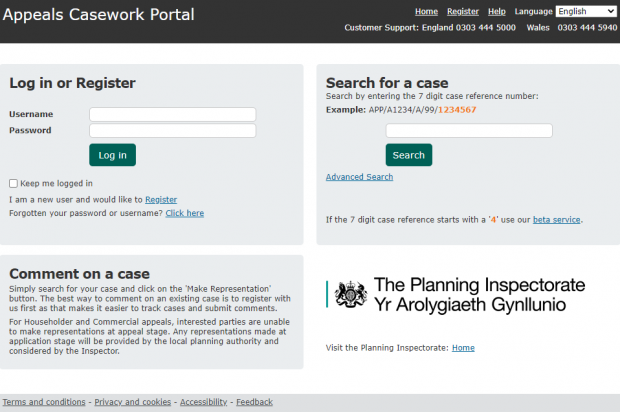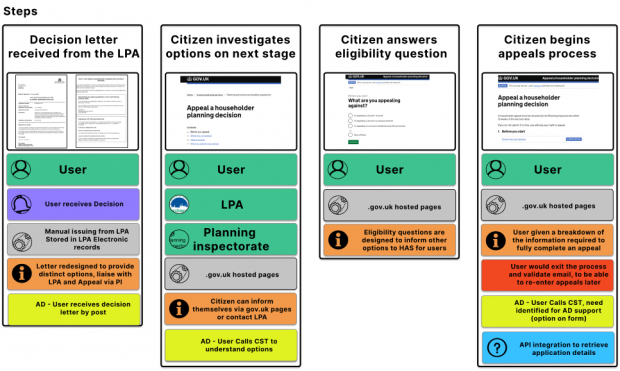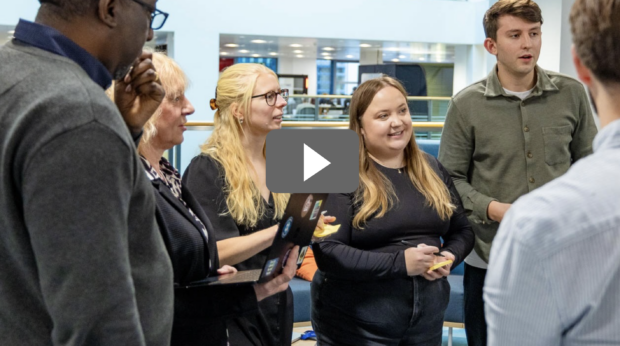One of the great things about stepping into the product manager role on a service you have worked with for years is that you already know all the problems. You don't have to worry about doing any more time-consuming research – you can just crack on with building the service.
Just kidding. In the words of Dr Manhattan, “Nothing ever ends”. Despite recently finishing the Alpha phase, we have found that Discovery never ends.
Over at the Planning Inspectorate we are transforming the Appeal a Householder Planning Decision service. The service lets householders appeal if their application for home improvement works is refused by their local council. From a digital perspective, it’s a live service that was built almost a decade ago but hasn’t been iterated since.
A service without a manual
Despite fears that the world would end, the Planning Inspectorate launched the Appeals Casework Portal in 2012. It does many things well, but it withers under the light of modern user experience and service standards.
That’s not a surprise when you consider its age and that it was built prior to the inception of the GDS Service Manual - a dark time in history!
We recognised that the live service no longer met the needs of our users... and it turned out that we needed to do some work to find out what those user needs were.

Even though this is a service for homeowners, and our simplest in terms of user input, 80% of the householder appeals we receive are via an agent of some kind, for example an architect or planning consultant. We wanted to change that, and ensure that householders can appeal without help.
You can choose to pay an agent to appeal if you want to, but it should not be a necessity or a prerequisite for a particular outcome. We started a comprehensive programme of user research to understand our potential service users and their needs. We found out that they:
- had very poor awareness of the existence of the service itself
- did not know Planning Inspectorate was independent from their local council
- were confused by the terminology used in our service
- did not know how long it would take to get a decision on their appeal
As they have already spent months on plans and dealing with the council hoping to extend their home to accommodate their growing family, and then their plans are refused, our users often come to us in an anxious state.
Mapping user journeys
So, where to start? Where does our service begin? Surely the ‘Start now’ page on GOV.UK, right? Not in this case. We discovered our service begins with a document that is not even issued by us.
The decision notice is a letter produced by local councils that informs applicants of the success or failure of their planning application. These notices vary wildly from council to council, as does the guidance on how to appeal if they have been refused permission.
If we were to prevent our users from being ‘lost down the sofa cushions’ of the planning system, we needed a model version of this notice that gives the homeowner all the information they require to make the best decision for them.
Initially I was worried about spending too much time on this – what if the councils did not want to use it? So far, the small group we have talked to have been very receptive. There are hundreds of councils, but to bring about effective change we need to engage with them directly. Another lesson we learnt from our Alpha.

Finding the opportunities to transform
Later on in the appeal submission journey, users are asked to provide a written statement to support their appeal - an opportunity for them to put their case forward and respond to the council's decision to refuse permission.
Our research showed that this is the most likely point for our users to:
- pause and do some research
- decide that they need help from a professional planner
- drop out altogether
In the past, we avoided providing too much guidance because we felt it compromised our impartiality. We have reconsidered this position – designing a good interaction means making this as simple as possible for the user and giving them help to complete it. But we are not giving any user custom advice, just enabling them to engage properly with the process.
Finally, we discovered that while we ask the user for a lot of data, very little of that is ‘new’ – they have already supplied most of it to their council at application stage. So even though that data is held elsewhere, the user feels that they are being asked for things twice.
We have now hit our biggest technical challenge and the biggest opportunity for transformation. Integration with the wider planning system could change the service for users - and for the Planning Inspectorate – beyond all recognition. And our Alpha phase is running alongside the incredibly exciting work being done in the Reducing Invalid Planning Applications and Back Office Planning System projects.
Build a team and have fun
So now I am product manager of a service with big ambitions. And the reason it feels achievable is because we have an incredible team of specialists who are collaborating every day - researching, refining, innovating.
I have come to realise how essential user researchers, service designers, interaction designers, content designers and business analysts are to building a successful service (we have not had many of these roles in the Planning Inspectorate before). They are the reason we passed our Alpha assessment. Every day, they help open my eyes to a new way of looking at things, and it's genuinely exciting.
There are always new things to find out about your customers, your service and your organisation. And it's fun to be surprised by what you discover on any given day. To operate under the assumption that you will never know everything there is to know about your service. Even decades of experience can be subverted.
As a colleague said to me during a recent show and tell: "I've worked here for 30 years, and I've never known that to be a problem."
Ah. But you are still in Discovery.
Subscribe to the MHCLG Digital blog for more updates on our projects.



3 comments
Comment by Alan Murphy posted on
This sounds like you are saying that councils refuse Planning applications for flippant reasons that can easily addressed by the average lay- person. They don’t (in the vast majority of cases!) and the lay person will not generally be able to make a robust rebuttal to a planning refusal dealing with all the planning policies and technical matters.
I think you are confusing the ‘process’ of submitting a planning appeal (which is the aspect that The Portal deals with) and the ‘substance’ of an appeal.,which is what needs to be IN the appeal statement.
I’m afraid you will be doing your users a serious dis-service by getting them to confuse these two separate aspects of a planning appeal by doing both themselves. Sure you could and should make it possible for them to SUBMIT and appeal but they in most cases will also need a professional to prepare the actual written appeal.
Think again.
Comment by Andrew Thomas posted on
Totally agree with the comment by previous poster.
Also -
Your blog seems to be describing a deliberate intention to discourage professional representation on behalf of the appellant. This fails to acknowledge that the LPA concerned will have probably refused the application on the basis of a judgment from a professionally qualified town planner and neighbouring objectors might also have been represented professionally. Surely it is neither fair nor impartial to seek to deny the appellant the same right of representation? Neither is it open or transparent to try to "tweak" the process behind the scenes in such a way that it seeks to discourage such representation for the appellant.
The appeal process is not user friendly because the substance of the appeal is heavily geared to an understanding of the legislation, regulation, policy, guidance and advice that dictates whether an appeal should be allowed or not. That is where the "problem" rests and whilst this persists, it will remain necessary for the average user to be professionally represented if they want to give their appeal the best chance of success.
There are many other ways that the average user's experience at appeal could be improved - for example, mandating standardisation of the way how application information, development plan policies and relevant data are served/displayed on a Council's website.
Comment by Ed Burnett posted on
Thank you for engaging with us by posting your response. I’ll try and address all the points you raise which are very important ones.
Firstly, we do not think or have any evidence to suggest that local authorities make flippant decisions and it certainly wasn’t my intention to imply that.
Secondly, paying for an agent is a choice solely for the appellant to make. That won’t change. Our motivation is to ensure that the service itself is not a barrier for the appellant, and that’s the key thing. For example - where we can, we will make every effort to ensure that we don’t use technical terminology when we don’t need to. We want the appellant to have all the information they need to make the best decision for them. As you say, that might mean they have professional help with the statement but submit themselves, or it may mean they still choose to have an agent take care of everything. But it should be their informed choice.
We are designing this to meet modern government standards for public services.
https://www.gov.uk/service-manual/service-standard